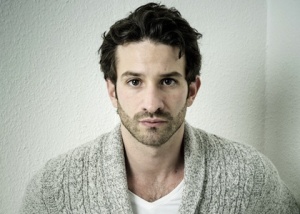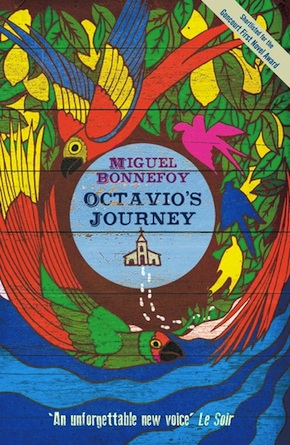I, Octavio
by Miguel BonnefoyThe day I finished my degree in modern literature at the Sorbonne in May 2010, I was called before a board of examiners to present my dissertation on the ‘engaged literature’ of the interwar period. After I had spoken for three hours, I was awarded my MA. I went off to celebrate with friends from the Sorbonne. But instead of partying, we ended up discussing the placement of commas in the work of Proust. That was the moment I realised how removed I had become from the real world. It dawned on me that I had spent five years of my life in a Parisian intellectual literary bubble, totally detached from the notion of political engagement I had argued for in my dissertation. I was suddenly seized with an urgent, almost physical need to go back to my country, Venezuela, following in the footsteps of Rimbaud: “I have a duty to seek and a rough reality to embrace.”
Back in Caracas, I became a French teacher at the Alliance Française, while also doing marketing for cultural events for the City Hall in Plaza Bolivar. Leading this double life meant I could maintain my links with France, while contributing to the arts world in Venezuela. I was coming out of a lesson one day when I saw a poster inviting young writers from around the world to enter the Prix du Jeune Ecrivain by sending a short story to an address in Muret, near Toulouse. I sent in my story ‘Icarus’. A few months later, I got an email saying the committee had received a thousand applications from twenty-eight different countries. The judging process began and, six months later, I found out I had won.
I was invited to come to France for a week to receive the award and meet publishers, the sponsors, patrons and organisers of the prize, and the other young authors. This was March 2013. Hugo Chávez had just died and I had barely written a word in three years. When I arrived in France, we were taken to the Salon du Livre (the Paris Book Fair) for the prize-giving ceremony. I was asked to give a speech in front of a large audience. A woman came up to me at the end. Her name was Émilie Colombani, and as an editor of French literature at Rivages, she was on the lookout for new writers to sign. She asked if I had written anything besides ‘Icarus’, if by any chance I had a novel stashed away. On impulse, perhaps to save my pride or out of a sense of adventure, I immediately lied and said I had an excellent novel sitting in a drawer. She asked if she could read it and I told her I just needed a few months to polish it. She gave me her card and asked me to send her the manuscript once it was finished.
I never took the return flight to Venezuela. That day at the Salon du Livre I made the crazy decision to stay in France and write a novel. I shut myself inside the Bibliothèque Nationale de France, the same library in which I had written my dissertation a few years before, to avoid distractions, cutting myself off from the noise and chaos of the world outside. I needed to earn a living, so I applied for a position as an attendant at the Grand Palais. I worked there for four months, selling tickets, protecting the exhibits and checking visitors’ discount cards, student and press IDs or proof of unemployment. Whenever I had a spare moment, I would head into the staff room and read over my manuscript, revisiting phrases, correcting mistakes, building a character or ironing out infelicities. As soon as I got home, I would pick it up again and go back over clumsy passages, polish the text, flesh out a scene or work on the structure. My subject and story were everything.
She asked if by any chance I had a novel stashed away. On impulse, perhaps to save my pride or out of a sense of adventure, I immediately lied and said I had an excellent novel sitting in a drawer.”
But I needed more money to live on, so I took a job as a night porter at a hotel in the Ternes area, not far from the Arc de Triomphe. I was responsible for taking reservations, greeting evening arrivals, filing photocopies of passports and identity cards, taking breakfast orders, answering the phone and forwarding emails to the relevant people. I had to stay up all night. At the quietest time, around 3 am, I would get out the manuscript of Octavio and work on the text. Sitting behind that dreary desk, in the middle of those cold and hungry nights, I gave myself up to tropical splendour, stories of love and death, heroic acts and dense forests. I was never as unhappy in a job, nor as happy to use writing as an act of resistance against boredom.
A year later, I finished my draft of the text. I arranged to meet Émilie in an Italian restaurant. She ordered ravioli. I placed the manuscript – then entitled The Earth We Carry With Us – in front of her on the table. She told me to give her a week to read it, and four days later I got a call. (I was in the supermarket buying tomatoes.) She was full of praise for the book and told me she wanted to publish it. She asked me to come to the Rivages offices to sign the contract. When I arrived, we set to work on the body of the text, cutting out the fat, stripping it down to the bone and perfecting it. She told me, “You’ve brought us a diamond in the rough, still embedded in the rock, not yet shaped or sparkling. My job is to polish it and turn it into a piece of jewellery.”
Now, with hindsight, I can see how much of myself there is in Octavio, or how much of him there is in me. I can see that I wrote my story through fable, allegory and myth. Most founding myths and tales can be reduced to a simple narrative structure: creation of a world; a person with a calling, destined for an adventure, who learns something, overcomes various obstacles and returns transformed, ready to make the world a better place. I invented nothing, I simply recounted the hero’s journey using the classical sequence of myths: creation of a world (birth of the barrio); separation of Heaven and Earth (a burglary at Venezuela’s home, which causes a rupture in the narrative); the defeat of the dragon (the death of the host); punishment by flood (crossing the torrent – figure of the ferryman); new beginnings (return to the barrio, restoration of the theatre); man elevated to the rank of the gods (metamorphosis into a wooden statue). So, after Proust’s commas, the crazy decision to stay in France, the library, the Grand Palais, my nights at the hotel, all the struggles I had to face, I can say that Octavio’s Journey was my journey too.
 Miguel Bonnefoy was born in France in 1986 to a Venezuelan mother and a Chilean father. Octavio’s Journey, his first novel, has sold more than 25,000 copies in France and been awarded the Prix Edmée de la Rochefoucauld for debut novels, the Prix Fénéon and the Prix de la Vocation, which rewards new talent. The book was also shortlisted for the Prix des Cinq Continents and the Goncourt First Novel Award. Octavio’s Journey is out now in paperback from Gallic Books, translated by Emily Boyce.
Miguel Bonnefoy was born in France in 1986 to a Venezuelan mother and a Chilean father. Octavio’s Journey, his first novel, has sold more than 25,000 copies in France and been awarded the Prix Edmée de la Rochefoucauld for debut novels, the Prix Fénéon and the Prix de la Vocation, which rewards new talent. The book was also shortlisted for the Prix des Cinq Continents and the Goncourt First Novel Award. Octavio’s Journey is out now in paperback from Gallic Books, translated by Emily Boyce.
Read more.
Author portrait © Frédéric Stucin
Emily Boyce is in-house translator and editor at Gallic Books.
@BelgraviaB


